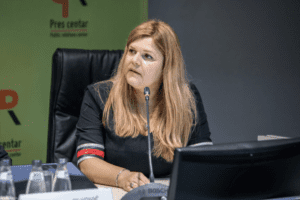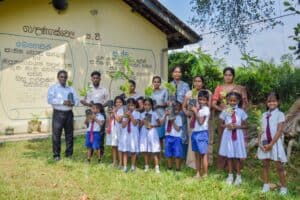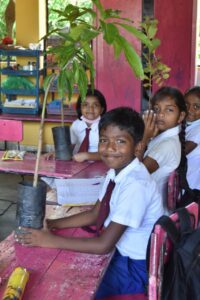
Empowering Children with Disability in Montenegro

GNRC member Djeca Crne Gore-Children of Montenegro focuses on children and youth living with disability. Since 2016, we have provided sessions for children with psychologists, speech therapists, social workers, and personal assistants, free of charge, with support from donors. This is because it is a challenge to get experts who can work with children in areas where most people speak Albanian. Aside from the language barrier, large class sizes prevent individualized learning plans for children in public schools, raising the potential for bullying.
Despite challenges posed by COVID-19, we assisted twenty-one families whose children received daily hour-long individual treatments. We organized ten workshops with families to help them overcome stress and come to terms with their children’s unique situations. The workshops helped them establish self-care so they can be of more support to their children. The parents also learned how to play with their children and stimulate their development. Additionally, we organized training for forty teachers on how to tailor educational plans to individual children, as well as develop transitional plans for those entering secondary school.
Our future plans include building stronger connections with institutions and practitioners to better respond to needs and engaging more local authorities.
I am most grateful that our efforts are being recognized countrywide, and I feel privileged to have been awarded the Iskra Philanthropy Award, a special recognition for civic contribution to the common good.
Sabra Decević
Coordinator, GNRC Montenegro
The post <strong>Empowering Children with Disability in Montenegro</strong> appeared first on Global Network of Religions for Children.
The post Empowering Children with Disability in Montenegro appeared first on Arigatou International.

Youth Responding to Climate Change in South Africa

On September 19th, 2020, GNRC South Africa launched the Zimbali Zonke Garden4Life Project at a children’s interfaith day camp. The launch owed to the run-up to the United Nations International Day of Peace. Since its launch, the project has continued to be a platform to share and take action to mitigate climate change.
South Africa is particularly vulnerable to the impacts and effects of climate change. Temperatures are rising, and rainfall is increasing yearly, causing serious problems and damage. The Sustainable Development Goals call for action to protect the planet to ensure that all people enjoy peace and prosperity. The GNRC’s mission and vision of building a better world for children include caring for our earth. We look at how we can offer balanced education to our children and youth to include care for the environment and understanding how climate change affects us. We, at GNRC South Africa, consider knowledge, understanding, and action on climate change as part of our personal commitments to protect the earth.
We commit to learning more about the impacts of climate change and understanding how we can support environmental action locally. It is with this in mind that we started a vegetable garden for our children at the World Assembly of Muslim Youth premises in 2021.
Ms. Saydoon Nisa Sayed
Coordinator, GNRC South Africa
The post Youth Responding to Climate Change in South Africa appeared first on Global Network of Religions for Children.
The post Youth Responding to Climate Change in South Africa appeared first on Arigatou International.

Youth Responding to Climate Change in South Africa

On September 19th, 2020, GNRC South Africa launched the Zimbali Zonke Garden4Life Project at a children’s interfaith day camp. The launch owed to the run-up to the United Nations International Day of Peace. Since its launch, the project has continued to be a platform to share and take action to mitigate climate change.
South Africa is particularly vulnerable to the impacts and effects of climate change. Temperatures are rising, and rainfall is increasing yearly, causing serious problems and damage. The Sustainable Development Goals call for action to protect the planet to ensure that all people enjoy peace and prosperity. The GNRC’s mission and vision of building a better world for children include caring for our earth. We look at how we can offer balanced education to our children and youth to include care for the environment and understanding how climate change affects us. We, at GNRC South Africa, consider knowledge, understanding, and action on climate change as part of our personal commitments to protect the earth.
We commit to learning more about the impacts of climate change and understanding how we can support environmental action locally. It is with this in mind that we started a vegetable garden for our children at the World Assembly of Muslim Youth premises in 2021.
Ms. Saydoon Nisa Sayed
Coordinator, GNRC South Africa
The post Youth Responding to Climate Change in South Africa appeared first on Global Network of Religions for Children.
The post Youth Responding to Climate Change in South Africa appeared first on Arigatou International.

‘Grow trees with Children’ – Sri Lanka

The End Child Poverty  Knowledge Centre, joined hands with the Sarvodaya Shramadana Movement in planting trees to commemorate ECP@10 (10th anniversary of Arigatou International – End Child Poverty).
Knowledge Centre, joined hands with the Sarvodaya Shramadana Movement in planting trees to commemorate ECP@10 (10th anniversary of Arigatou International – End Child Poverty).
The Knowledge Center visited two schools in Galle District where they planted hundreds of trees and distributed tree seedlings among children, parents, teachers and staff and members of Sarvodaya Shramadana Societies to plant a in their gardens. These tree seedlings were carefully selected to be compatible with the ecosystem in the area as well as fruit trees to promote zero hunger. They included Jack Plants, Cashew Plants, Mango Plants and Guava plants.
The tree-planting campaign is being conducted in 25 districts in Sri Lanka and aims to plant more than 2000 plants across the country. Tree planting is part of the wider ECP@10 campaign and aims to grow 1 million trees worldwide as a way of mobilizing our constituencies to face the challenge of climate change and its nexus. with poverty.
The post <strong>‘Grow trees with Children’ – Sri Lanka</strong> appeared first on End Child Poverty.
The post ‘Grow trees with Children’ – Sri Lanka appeared first on Arigatou International.

‘Grow trees with Children’ – Sri Lanka

The End Child Poverty  Knowledge Centre, joined hands with the Sarvodaya Shramadana Movement in planting trees to commemorate ECP@10 (10th anniversary of Arigatou International – End Child Poverty).
Knowledge Centre, joined hands with the Sarvodaya Shramadana Movement in planting trees to commemorate ECP@10 (10th anniversary of Arigatou International – End Child Poverty).
The Knowledge Center visited two schools in Galle District where they planted hundreds of trees and distributed tree seedlings among children, parents, teachers and staff and members of Sarvodaya Shramadana Societies to plant a in their gardens. These tree seedlings were carefully selected to be compatible with the ecosystem in the area as well as fruit trees to promote zero hunger. They included Jack Plants, Cashew Plants, Mango Plants and Guava plants.
The tree-planting campaign is being conducted in 25 districts in Sri Lanka and aims to plant more than 2000 plants across the country. Tree planting is part of the wider ECP@10 campaign and aims to grow 1 million trees worldwide as a way of mobilizing our constituencies to face the challenge of climate change and its nexus. with poverty.
The post <strong>‘Grow trees with Children’ – Sri Lanka</strong> appeared first on End Child Poverty.
The post ‘Grow trees with Children’ – Sri Lanka appeared first on Arigatou International.






